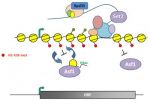Many medications for elderly are prescribed inappropriately
2012-08-23
(Press-News.org) Approximately one in five prescriptions to elderly people is inappropriate, according to a study published Aug. 22 in the open access journal PLOS ONE.
The authors of the study, led by Dedan Opondo of the Academic Medical Center in Amsterdam, conducted a systematic review of English-language studies of medication use in the elderly and found that the median rate of inappropriate prescriptions was 20.5%. Some of the medications with the highest rates of inappropriate use were the antihistamine diphenhydramine, the antidepressant amitriptyline, and the pain reliever propoxyphene.
INFORMATION:
Citation: Opondo D, Eslami S, Visscher S, de Rooij SE, Verheij R, et al. (2012) Inappropriateness of Medication Prescriptions to Elderly Patients in the Primary Care Setting: A Systematic Review. PLoS ONE 7(8): e43617. doi:10.1371/journal.pone.0043617
Contact: Dedan Opondo, d.o.opondo@amc.uva.nl +31626440889.
Financial Disclosure: These authors have no support or funding to report.
Competing Interest Statement: The authors have declared that no competing interests exist.
PLEASE LINK TO THE SCIENTIFIC ARTICLE IN ONLINE VERSIONS OF YOUR REPORT (URL goes live after the embargo ends):
http://dx.plos.org/10.1371/journal.pone.0043617
END
ELSE PRESS RELEASES FROM THIS DATE:
2012-08-23
Two parasitic wasp species show similar memory consolidation patterns in response to rewards of different quality, providing evidence that the reward value affects the type of memory that is consolidated. The full results are reported Aug. 22 in the open access journal PLOS ONE.
The researchers, led by Marjolein Kruidhof of the Netherlands Institute of Ecology, tested how wasps store scents associated with situations of low reward (egg-laying into a inferior-quality host species that lays single eggs) versus high reward (egg-laying into a superior-quality host species ...
2012-08-23
Patients with anorexia have trouble accurately judging their own body size, but not others', according to research published Aug. 22 in the open access journal PLOS ONE.
In the study, led by Dewi Guardia of the University Hospital of Lille in France, 25 patients with anorexia and 25 controls were shown a door-like aperture and asked to judge whether or not it was wide enough for them to pass through, or for another person present in the room to pass through. In previous similar experiments, anorexic patients felt they could not pass through the door even when it was easily ...
2012-08-23
KANSAS CITY, MO—The first step in gene expression is the exact copying of a segment of DNA by the enzyme known as RNA polymerase II, or pol II, into a mirror image RNA. Scientists recognize that pol II does not transcribe RNA via a smooth glide down the DNA highway but instead encounters an obstacle course of DNA tightly wound around barrier proteins called histones. Those proteins must be shoved aside for pol II to trundle through.
Previous work from the lab of Jerry Workman, Ph.D., an investigator at the Stowers Institute for Medical Research, showed how a protein ...
2012-08-23
A study from the University of California, San Diego School of Medicine, published August 22 online by PLoS ONE, reports that muscle problems reported by patients taking statins were related to the strength or potency of the given cholesterol-lowering drugs.
Adverse effects such as muscle pain and weakness, reported to the U.S. Food and Drug Administration (FDA) were related to a statin's potency, or the degree by which it typically lowers cholesterol at commonly prescribed doses.
"These findings underscore that stronger statins bear higher risk – and should be used ...
2012-08-23
Having healthy gut bacteria could have as much to do with a strategy that insurance companies use to uncover risk as with eating the right foods, according to researchers at the University of East Anglia (UEA).
Findings published today in Ecology Letters show how researchers applied a strategy used by insurance companies to understand how animals and plants recruit beneficial bacteria.
The breakthrough brings scientists closer to understanding the human body's relationship with bacteria, which account for nine cells out of every 10 in our bodies.
The research has ...
2012-08-23
AMHERST, Mass. – A recent study of residential landscape types and native bird communities in Phoenix, Ariz., led by a University of Massachusetts Amherst urban ecologist suggests that yards mimicking native vegetation and wildlands offer birds "mini refuges," helping to offset the loss of biodiversity in cities and supporting birds better than traditional grass lawns and non-native plantings.
The study, led by Susannah Lerman with her advisor Paige Warren at UMass Amherst, and Hilary Gan and Eyal Shochat at Arizona State University, is one of the first to use quantitative ...
2012-08-23
Friends are equally important to men and women, but family matters more for men's wellbeing Online First doi 10.1136/jech-2012-201113
The midlife wellbeing of both men and women seems to depend on having a wide circle of friends whom they see regularly, finds research published online in the Journal of Epidemiology and Community Health.
A network of relatives is also important—but only for men—shows the study of more than 6500 Britons born in 1958.
The authors base their findings on information collected from the participants, all of whom were part of the National ...
2012-08-23
A global assessment of the oesophageal adenocarcinoma epidemic Online First doi 10.1136/gutjnl-2012-302412
The global "epidemic" of one type of gullet cancer (adenocarcinoma) seems to have started in the UK during the 1950s, sparked by some as yet unknown, but common, factor, suggests research published online in Gut.
There are two distinct types of gullet (oesophageal) cancer—squamous and adenocarcinoma, the latter typically affecting the lower third of the oesophagus.
It was first realised that diagnoses of adenocarcinoma were increasing rapidly in several regions ...
2012-08-23
Boston, Mass., August 23, 2012 – Substantial racial and ethnic disparities were found for a broad set of harmful health-related issues in a new study of 5th graders from various regions of the U.S. conducted by Boston Children's Hospital and a consortium of research institutions. Black and Latino children were more likely than white children to report everything from witnessing violence to engaging in less exercise to riding in cars without wearing seatbelts. At the same time, the study found that children of all races and ethnicities did better on these health indicators ...
2012-08-23
New born human infants have the largest brains among primates, but also the highest proportion of body fat. Before birth, if the supply of nutrients from the mother through the placenta is limited or unbalanced, the developing baby faces a dilemma: should resources be allocated to brain growth, or to fat deposition for use as an energy reserve during the early months after birth?
Scientists at the University of Southampton have shown that this decision could have an effect on how fat we are as children.
In new research, published in the journal PLoS ONE today (22 August ...
LAST 30 PRESS RELEASES:
[Press-News.org] Many medications for elderly are prescribed inappropriately

